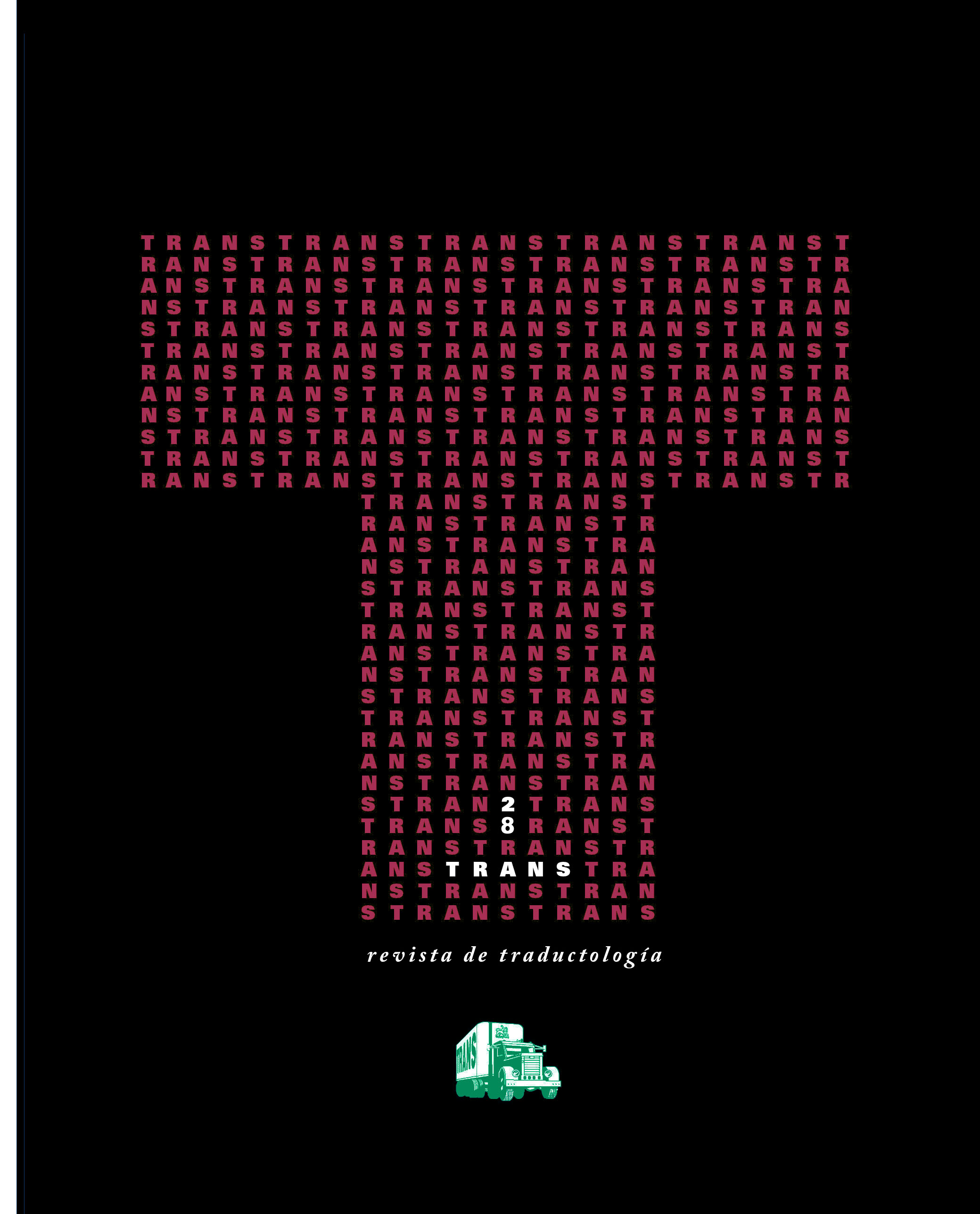Queerness between the lines: a proposed translation and analysis of lesbianism in Malinda Lo's Las Night at the Telegraph Club (2021)
DOI:
https://doi.org/10.24310/trt.28.2024.17772Palabras clave:
LGBTQIA+ translation, lesbian translation, literary translation, euphemisms, translation modesResumen
Stories of lesbian women have traditionally been silenced through translations, which entails a general lack of adequate language dealing with their sexual identities. On this basis, this translation proposal and analysis approaches the translation of lesbianism from English into Spanish focusing on the classification and analysis of terminology used in lesbian groups. This analysis also delves into the strategies adopted to either conceal or openly display homosexuality, thus opting for either preserving or disputing the taboo surrounding the LGBTQIA+ community. The results reveal a higher percentage of euphemistic and distancing expressions that deem lesbianism a taboo. This, therefore, highlights an evident rejection of lesbian women, which reflects the attitude held towards them both in San Francisco during the 1950s and in Francoist Spain. On the other hand, great attention is provided to the deficit of accurate terminology in the TL when reproducing expressions typically used amongst the LGBTQIA+ community, which may compromise the accurate reproduction of lesbian identity.
Descargas
Métricas
Publicación Facts
Perfil de revisores N/D
Información adicional autores
Indexado: {$indexList}
-
Indexado en
- Sociedad Académica/Grupo
- N/D
- Editora:
- Universidad de Málaga
Citas
Breen, M. S. (2012). Homosexual identity, translation, and prime-Stevenson's Imre and the intersexes. CLCWeb: Comparative Literature and Culture, 14(1). https://doi.org/10.7771/1481-4374.1786
Cambridge English–Spanish dictionary: Translate from English to Spanish. Cambridge Dictionary. (n.d.). Retrieved April 7, 2022, from https://dictionary.cambridge.org/dictionary/english-spanish/
Démont, M. (2017). On three modes of Translating Queer Literary texts. Queering Translation, Translating the Queer, 157–171. https://doi.org/10.4324/9781315505978-12
English dictionary, translations & thesaurus. Cambridge Dictionary. (n.d.). Retrieved April 30, 2022, from https://dictionary.cambridge.org/
Giustini, D. (2015). Gender and Queer Identities in Translation. From Sappho to present feminist and lesbian writers: translating the past and retranslating the future. Norwich Papers: Studies in Translation, 1–12.
Glosario de Términos - Lambda Valencia. LambdaValencia. (n.d.). Retrieved April 2022, from https://lambdavalencia.org/es/glosario-de-terminos/
Gramling, D. (2018). Queer/LGBT approaches. The Routledge Handbook of Literary Translation, 495–508. https://doi.org/10.4324/9781315517131-33
Harvey, K. (2007). Gay community, Gay Identity and the translated text. TTR: Traduction, Terminologie, Rédaction, 13(1), 137–165. https://doi.org/10.7202/037397ar
Harvey, K. (2014). Translating camp talk: gay identities and cultural transfer. The Translation Studies Reader, 352–372. https://doi.org/10.1080/13556509.1998.10799024
Kramer, M. (2014). The problem of translating queer sexual identity. Neophilologus, 98(4), 527–544. https://doi.org/10.1007/s11061-014-9398-0
Llopis Mestre, S., & Zaragoza Ninet, G. (2020). Censura y traducción al español de la Novela Lésbica en inglés: El Caso de Rubyfruit Jungle (1973). TRANS. Revista De Traductología, (24), 353–374. https://doi.org/10.24310/trans.2020.v0i24.6813
Lo, M. (2021). Last Night at the Telegraph Club. Dutton Books.
Martínez-Expósito, A. (2013). Queer Literature in Spain: Pathways to normalisation. Culture & History Digital Journal, 2(1), 1–9. https://doi.org/10.3989/chdj.2013.010
Martínez Pleguezuelos, Antonio. J. (2018). Traducción e Identidad Sexual: Reescrituras Audiovisuales desde la Teoría Queer. Editorial Comares.
Molina, L., & Hurtado Albir, A. (2002). Translation Techniques Revisited: A Dynamic and Functionalist Approach. Meta: Journal Des Traducteurs/Meta: Translators' Journal, XLVII(4), 498–512.
Piñero Gil, E. (2015). Traducción y género: evolución teórica y práctica de una poética feminista. In Penas Ibáñez, M. A. (Ed.) La traducción: Nuevos planteamientos teóricometodológicos (pp. 239–259). Síntesis.
Ranger, H. (2019). ‘Reader, I married him/her’: Ali Smith, Ovid, and Queer Translation. Classical Receptions Journal, 11(3), 231–255. https://doi.org/10.1093/crj/clz009
Real Academia Española (n.d.). Diccionario de la lengua española. Retrieved April 2022, from https://dle.rae.es/
Santaemilia, J. (2017). Sexuality and Translation as Intimate Partners? Toward a Queer Turn in Rewriting Identities and Desires. Queering Translation, Translating the Queer, 11–25. https://doi.org/10.4324/9781315505978-2
Spurlin, W. J. (2014). Introduction: The Gender and Queer Politics of Translation: New Approaches. Comparative Literature Studies, 51(2), 201–214.
Spurlin, W. J. (2014). Queering Translation. A Companion to Translation Studies, 298–309. https://doi.org/10.1002/9781118613504.ch22
Webster, N. (n.d.). Webster's New International Dictionary of the English language. G. & C. Merriam Co., Retrieved April 2022, from https://www.merriam-webster.com/
Publicado
Cómo citar
Número
Sección
Licencia
Derechos de autor 2024 Anesa Muslimovic Ortega

Esta obra está bajo una licencia internacional Creative Commons Atribución-NoComercial-CompartirIgual 4.0.
Todos los contenidos publicados en TRANS. Revista de Traductología están sujetos a la licencia Creative Commons Reconocimento-NoComercia-Compartirigual 4.0 cuyo texto completo puede consultar en <http://creativecommons.org/licenses/by-nc-sa/4.0>
Se pueden copiar, usar, difundir, transmitir y exponer públicamente, siempre que:
- Se cite la autoría y la fuente original de su publicación (revista, editorial y URL de la obra).
- No se usen para fines comerciales.
- Se mencione la existencia y especificaciones de esta licencia de uso.
- Compartir Igual — Si remezcla, transforma o construye sobre el material, debe distribuir sus contribuciones bajo la misma licencia que el original.
Los derechos de autor son de dos clases: morales y patrimoniales. Los derechos morales son prerrogativas perpetuas, irrenunciables, intransferibles, inalienables, inembargables e imprescriptibles. De acuerdo con la legislación de derechos de autor, TRANS. Revista de Traductología reconoce y respeta el derecho moral de los autores/as, así como la titularidad del derecho patrimonial, el cual será cedido a la Universidad de Málaga para su difusión en acceso abierto. Los derechos patrimoniales, se refieren a los beneficios que se obtienen por el uso o divulgación de las obras. TRANS. Revista de Traductología se publica en open access y queda autorizada en exclusiva para realizar u autorizar por cualquier medio el uso, distribución, divulgación, reproducción, adaptación, traducción o transformación de la obra.
Es responsabilidad de los autores/as obtener los permisos necesarios de las imágenes que están sujetas a derechos de autor.
Los autores/as cuyas contribuciones sean aceptadas para su publicación en esta revista conservarán el derecho no exclusivo de utilizar sus
contribuciones con fines académicos, de investigación y educativos, incluyendo el auto-archivo o depósito en repositorios de acceso abierto de cualquier tipo.













21.png)
